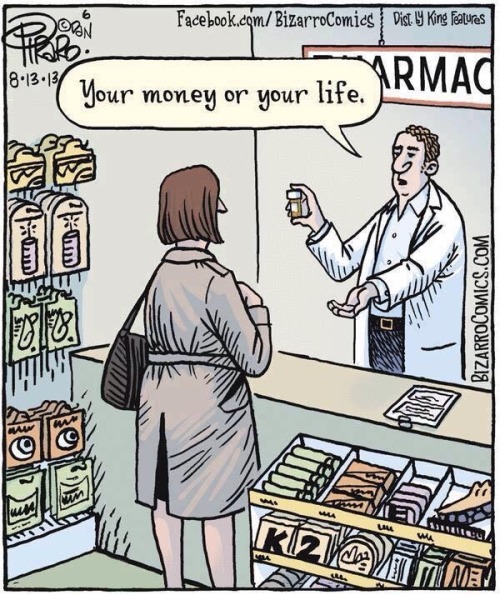In Crisis - Tumblr Posts
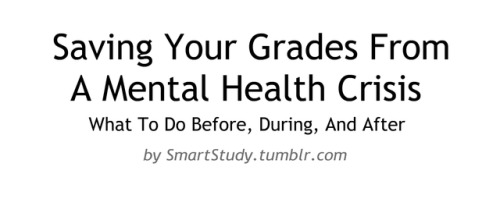
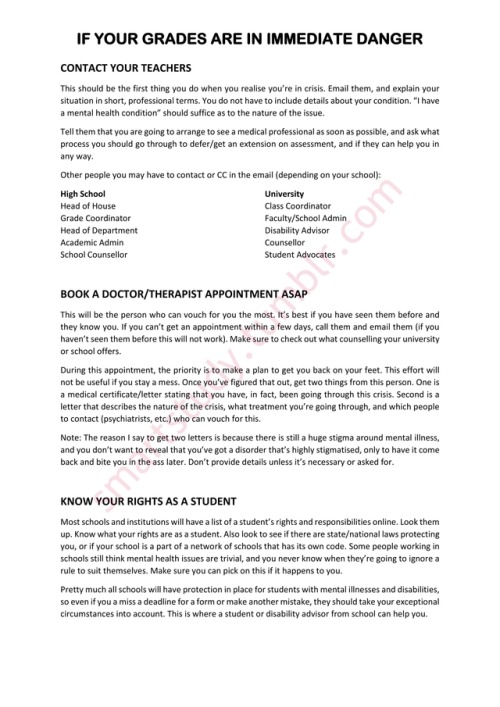
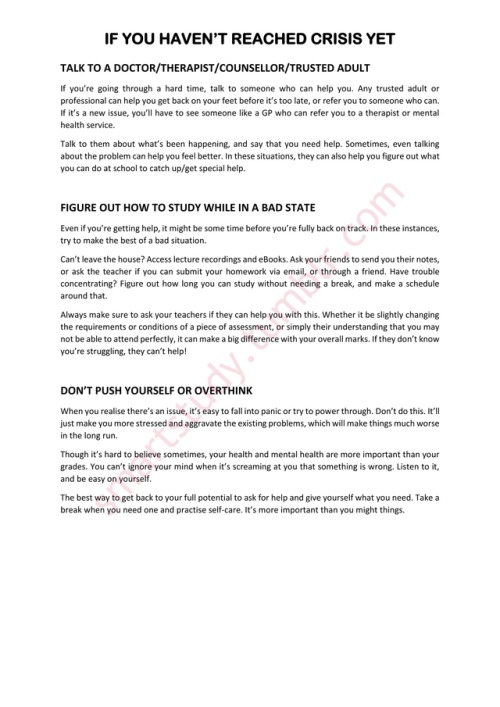
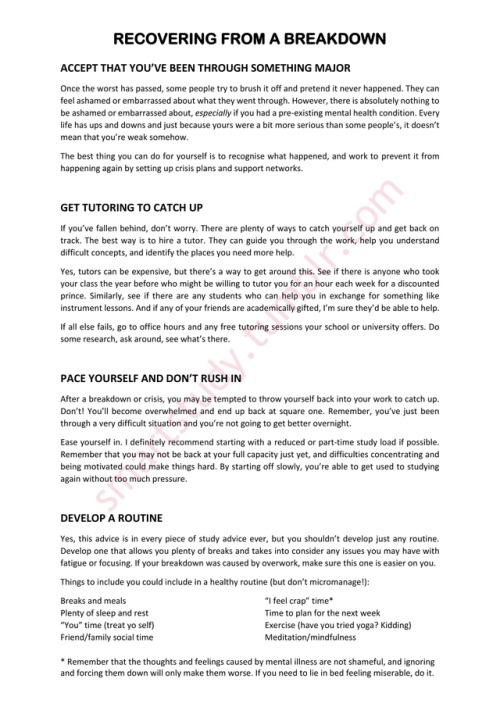
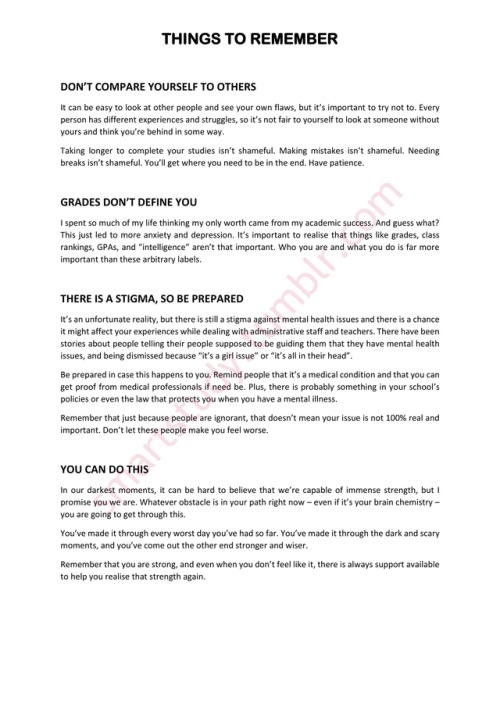
Hey guys. I’m glad to be finally posting my “mental breakdown survival guide”. As you know I struggle a lot with mental health, and so I have been through a lot of breakdowns. So many that I actually dropped out of university after 3 weeks in 2016 and had to take the whole year off. Because of this, I’ve made it my mission to help others with mental health issues as much as I can, so you don’t have to go through what I’ve been through.
Anyway, here is my guide. I tried to keep it general, and actually useful. If you have any questions or additions please feel free to add them.
And as ever, if you want to talk to me about studying with mental illness or want to see a post on a specific topic, please feel free to message me.
Tips to study in one week or less
Exams and finals are fast approaching for many people and we’ve all been in a place where we have too much to study and too little time to do it. I am an avid procrastinator so more often than not, I let all material build up in my desk and then I stress out to go over everything before the exam! Fear no more! I have the perfect formula for you!
Stop procrastinating! Going through productivity/study tips youtube videos or studyblrs is not going to do the work for you. Stop obsessing about it, leave your phone out of your study space and organize everything you have to do.
Make a list with all the chapters/topics you have to study. That way you can have a notion of everything you should know. Once you get over them, you can cross them out and feel productive enough to keep going. Trust me, that feeling is one of the best when you are studying!
Study smart, not hard — Understand what are the most important ones and focus on those. If you have little time, there is no way you can go over every material (if it’s too much like usually happens in college/uni) and also, no professor will question everything with the same detail in the exam.
Distribute the amount of material for the amount of days you have — leave at least 2 out. It’s important to organize the material during the amount of time you have so you don’t get too lazy in one day and then stress too much over the many things you have to study on another. Evaluate well what might take longer or not and if it doesn’t work as planned, adjust your plan in the end of the study day. The last two days before the exam are important to leave free for revisions and exam preparation.
In those last 2 days, test yourself. It can be previous exams from previous years (they’re the best option), tests online, quizzes with a friend. Exams from previous years are my favourite option - professors aren’t very original so it’s highly possibly that they will repeat questions. The line of questions are also very similar and even if there aren’t many repeated, at least you already know the basis. Tests online similar to what your professors use are also a good option as well as quiz a friend and vice versa, however, this last option might take longer and not work in little time. If you work well with a study buddy, testing each other would be beneficial for both.
REVIEW ONLY what you’re less prepared for, what you did wrong in the tests, what professors ask the most. If you don’t have enough time, you don’t want to waste it reviewing what you already know. If you know, you know. Believe and trust yourself!!
Don’t stress yourself, it will be alright. Stressing over little time can be a good pressure and motivator but too much can do the opposite effect and that’s not your intention. Find a balance, use your study breaks well enough to rest and relax so you won’t be too overwhelmed in the middle of an afternoon and do nothing the rest of the day.
GET A GOOD NIGHT SLEEP THE NIGHT BEFORE. You can wake up earlier to review but make sure you have at least 7 hours of sleep that night. Sleeping well the night before the exam is essencial for your brain to process everything you’ve studied. It will also allow your brain to be fresh and ready to work by the time you take the exam. If you are too tired from an all nighter, your brain will be tired and not work as quick and efficient as you need it.
Trust yourself. It doesn’t matter the amount of time you had, you still know the material. If you believe in yourself, you’re halfway passed!! You have to remind yourself that you did the best you could with the time you had. As long as you know that, you’ll feel so much lighter and the exam will go so much better. And if it doesn’t, you won’t feel guilty because you know you gave your best. In college/university, we never know everything or get out of an exam feeling like we scored the best grade ever.
College Executive Functioning Tips
Fair warning: this post is not really about doing homework, rather ideas for successfully acquiring/accessing more general living and organizational skills while dorming. Also, my first semester has been a shitshow so idk how qualified I am to give advice on the matter, but take it as you will. In a way it’s “things I learned the hard way”/a reflection on my first semester.
That being said, here we go:
1. To remember to bring the correct notebooks and materials, get a hanging clothes organizer and label for the 5/7 days of the week. Place the books/materials needed for each day on each labeled shelf. If you need certain books on multiple days, you can put index card placeholders or label what should be in each compartment.
2. Alternatively, you can get a mini days of the week dry erase board or a computer printout and write what materials you need on which days and which classes you go to (in order.)
3. This tip also works for homework: in college, the workload is much more predictable week to week, so if you always have online math due Monday, put it in another weekly table and schedule days to work on it in advance.
4. Schedule your asssignments to be done ahead of time. It’s a lot harder to get deadline-related accommodations in college and if you’re like me you feel uncomfortable asking for them. I’ve only needed to ask for one non accommodation included extension this semester, and it’s largely due to this.
5. Get. Your. Accommodations. In. Order. Before. The. School. Year. Starts. (if at all possible)
Learn from my mistakes. To be fair I didn’t have another option because my school requires everything to be done in person but it took me a month to get my letters which resulted in some awkward/discriminatory situations. Oops.
6. College accommodation processes are different than high school. There are no 504s/IEPs/under the table stealth accommodations here. Some colleges require retesting for your documentation. All require you to fill out a bunch of forms. You are largely responsible for knowing what helps you (though your liaison will likely make suggestions) so make a list of what worked for you in high school and will fly in college and request those (bring it with you to the meeting if you will forget). Also, your parents are generally forbidden from getting involved unless you sign a consent form, which is a huge change. You will need/be forced to develop self-advocacy skills. I definitely did. You also generally need to request to renew your accommodations every semester, and it’s your responsibility to remember. Set a reminder on your phone/digital calendar.
7. Post its are your friend. For me, they’ve been a valuable asset to my sucky working memory and using them minimizes resulting anxiety.
8. Laundry is hard, especially when you have physical disabilities. Double check your pockets or you might accidentally send your favorite pen through the wash and induce a meltdown. (To be fair I do check- which is why I said double check)
9. Choose specific dates/times to do your laundry, and set reminders. If you alternate lights and darks and do it, say, every Wednesday morning (pick an off time- Friday nights are great) you are a lot less likely to end up with a month’s worth of laundry and nothing to wear when you really need to look nice. Also, your suitcase can double as a rolling laundry basket.
10. Try to eat around the same times every day. Set alarms if you forget. Try to go on the off hours and eat as healthily as possible.
11. Clean your room before it gets too messy. This should go without saying but my drawers got junky by the end of the semester. Try scheduling a day of the week to do a quick clean up.
12. Your space can be a reflection of your mental state. I need things visually organized, but when I’m not doing well mentally I stop cleaning off my desk, putting my clothes in the laundry basket, making an attempt to make my bed, you name it. I’ve learned to recognize that this is a sign of stress and that tidying up a bit will make me feel a bit better.
13. College is not conducive to sleep, especially for work heavy majors. You. Need. (around) 8. (ish) Hours. Get them. It’s hard but everything else will fall apart if you don’t.
14. Make “ routine cards” for things like showering. Write down everything you need to take a shower on an index card and your steps for taking a shower (you can set a timer) so that you don’t take half an hour to get out your shampoo.
15. Drink water. Carry a water bottle so you have the visual reminder. Drink a glass at every meal. Schedule “teatime” and make an event of staying hydrated.
16. Allow yourself to relax. This is hard because the college environment demands you be “on” at all times, and this resulted in me feeling guilty for not studying when I was, well, not studying. I’m trying to work on scheduling times to work and times to not work, and to remember that I need to do fun things to take care of myself.
17. If you dress nicer than usual, you will apparently not look as depressed (assuming you have depression in the first place…). Use this to your advantage.
18. If you have un/undertreated/situational depression, get help before it gets really bad. I know a lot of college mental health offices push people away but put your self advocacy skills to use and get that counseling or whatever.
19. In the same vein, if you are struggling in a class (for whatever reason) don’t be ashamed to get extra help/sign up for tutoring. Especially if you’re like me and never needed to study a day in your life before this because the courses are structured differently.
20. Recognize your accomplishments. College can be really, really hard for people with impaired executive functioning, mental illnesses, developmental disabilities, etc. The change is hard and the learning curve is steep. But you’ve made it this far- so congrats! Celebrate!
If you liked this, please consider following my blog for more related content if you are not already. I post advice and sensory product reviews/suggestions.
This is a big, giant list of Youtube tutorials that will teach you all the basic life skills you need to know in order to be a functional adult. There are a lot of important skills that aren’t included in this list, but this should be enough of a basic guide to get you started and prevent you from making a total mess of yourself. Happy adulting! Household Skills:
How to unclog a toilet without a plunger
How to fix a blown fuse
How to fix a leaky faucet
How to clean soap scum from your tub and shower
How to escape from a house fire
How to make a budget and stick to it
How to sharpen a knife
How to clean a self-cleaning oven
How to clean red wine stains from carpet
How to clean blood stains from fabric
How to clean grease stains from fabric
How to do a load of laundry
How to iron your clothes
How to test your smoke detectors
Cooking Skills:
How to tell if produce is ripe
How to know if food is expired
How to properly sanitize a kitchen
How to cook an egg
How to make rice
How to make pasta
How to put out a kitchen grease fire safely
How to use a gas stove
How to use a convection oven
How to cook meat safely
How to use a stand mixer
How to use kitchen knives properly
How to make mashed potatoes
How to make grilled cheese sandwiches
Health Skills:
How to stop bleeding
How to treat a burn
How to do CPR (on an adult)
How to do CPR (on a child)
How to do CPR (on a baby)
How to help someone who is choking
How to save yourself if you are choking alone
How to read a nutrition label
How to treat frostbite
How to recognize when someone is having a stroke
How to maintain a healthy sleep schedule
Mental Health Skills:
How to calm down during a panic attack
How to help someone who is suicidal
How to meditate
How to stop self-harming
How to recognize problem drinking
How to choose a therapist
How to deal with disappointment
How to cope with grief
How to raise your self-esteem
Relationship and Social Skills:
How to apologize
How to cope with a breakup
How to accept criticism
How to deal with bullying
How to argue in a healthy way
How to ask someone out
How to break up with someone
How to recognize an abusive relationship
How to rekindle a damaged friendship
How to speak in public
Job Hunting Skills:
How to tie a tie
How to write a resume
How to write a cover letter
How to dress for a job interview (for women/femmes)
How to dress for a job interview (for men/masculines)
How to properly shake hands
How to nail a job interview
Other Skills:
How to sew on a button
How to hammer a nail
How to change your oil
How to put gas in your car
How to jump-start a car
How to pick a good password
How to back up your files
How to write a cheque
directory
click the tags on this post!
there’s general grownup stuff (#adulting, #self care, #saving money, #living n shit)
food (#food n stuff, #cooking, #recipes)
textbook links (#textbook)
essay writing tips (#do words good, #writing)
emergency advice (#in crisis, #medical)
posts with multiple kinds of help (#trail mix, #assorted tips)
How to Induce an Abortion or Take Emergency Contraception at Home with Proper Medications
Also includes how to use birth control pills as emergency contraception in case of emergency.
If safe for you to do so- please find a legitimate clinic - A list of legitimate US clinics is available here https://www.abortionfinder.org/ Do not do an internet search as fake clinics outnumber real clinics 12 to 1 in some parts of the US. "Crisis Pregnancy Centers" are FAKE Clinics.
If you need help obtaining funding contact one of these organizations: https://abortionfunds.org/need-abortion/
Abortion or EC, Which is right for me?
Medication Abortion: You are up to 13 weeks (91 days) pregnant but do not want to continue the pregnancy. Best results within the first 10 weeks of pregnancy.
Emergency Contraception, 'the morning after pill': Taken ASAP up to 5* days after intercourse. Use if you had unprotected sex or your contraception method failed and you do not want to become pregnant right now. EC will not terminate an existing pregnancy. EC is more effective the sooner it is taken, so if you are sexually active, obtain EC now so you have it on hand.
Medication Abortions:
What you need to know:
If you have an IUD you need to have it removed before inducing an abortion. The good news is those with IUDs are very unlikely to become pregnant.
Have a safety plan in case of rare emergency.
Do not breastfeed within 4 hours after taking these medications, best to pump before hand or use formula if you can.
Misoprostol is a common medication used to prevent stomach ulcers, you may also be able to find it for animal use.
Abortion With Mifepristone and Misoprostol:
You will need to take one 200mg pill of mifepristone and four to eight 200mcg pills of misoprostol (800-1600mcg). Ibuprofen is recommended for discomfort. Acetaminophen/paracetamol are not recommended.
Swallow one 200mg pill of mifepristone with water.
Wait 24-48 hours.
Place 4 misoprostol pills (200 mcg each for a total of 800 mcg) under your tongue and hold them there for 30 minutes as they dissolve. Do not speak or eat. After 30 minutes, drink water and swallow any remains. Then take ibuprofen. Bleeding and cramping should begin within within 3 hours.
24 Hour later: If you have not experienced bleeding or are unsure the abortion worked, place 4 additional misoprostol pills under your tongue, repeating step 3.
If mifepristone is not available, you can use misoprostol alone to end a pregnancy.
Abortion with Misoprostol only:
You will need to take twelve 200mcg pills of misoprostol (2400 mcg total). Ibuprofen is recommended for discomfort. Acetaminophen/paracetamol are not recommended.
Place 4 misoprostol pills (200 mcg each for a 800mcg dose) under your tongue and hold them there for 30 minutes as they dissolve, not speaking or eating. After 30 minutes, drink water and swallow any remains. Take ibuprofen.
Wait 3 hours.
Place another 4 misoprostol pills (200mcg each for a 800mcg dose) under your tongue and hold them there for 30 minutes until they dissolve. After 30 minutes, drink water and swallow any remains.
Wait another 3 hours.
Place a third set of 4 misoprostol pills (200mcg each for a 800mcg dose) under your tongue and hold them there for 30 minutes until they dissolve.
Make sure to take all 12 pills even if you start to bleed before you’ve taken all of them.
The World Health Organization recommends a follow-up with a doctor if:
You feel sick, or your pain is not getting better after 2 or 3 days. If this occurs, seek medical attention right away.
You still feel pregnancy symptoms two weeks after taking the abortion pills.
Your bleeding is heavy and not getting lighter after 2 weeks.
Emergency Contraception
If you have had unprotected sex or your contraception method has failed and you do not want to become pregnant. It is taken as one or two pills, according to the package directions, and is most effective if taken within 24 hours.
Which EC should I take?
There are two most common EC medications, Ulipristal (Ella) and Levonorgestrel (Plan B) and their generics. Ulipristal acetate (Ella) will be more effective and is a better choice for most people, but could be more expensive or difficult to obtain. It may also be possible to have an IUD implanted within the EC timeframe to prevent implantation, Talk to your doctor if this is an option.
"Plan B" (Levonorgestrel) may not work for you if you weigh more than 70 kg / 155 lbs, are currently ovulating, or it has been more than 3 days since intercourse. Take "Ella" (Ulipristal acetate) instead.
Levonorgestrel is a progestin medication. It stops the ovaries releasing eggs and prevents sperm from reaching and fertilizing any existing eggs. One dose is usually a 0.75 mg tablet.
Ulipristal acetate also delays ovulation, preventing your ovaries from releasing an egg when it normally would. However if an egg has been fertilized, Ulipristal also makes it difficult for the egg to embed in the uterus. One dose is usually a single 30 mg tablet.
Plan B reduces your risk of pregnancy by 88% if taken within 72 hours. It is most effective if taken within 24 hours (95% of cases).
Ella is even more effective at preventing pregnancy than Plan B. It is most effective if taken within 24 hours, is more effective than Plan B if taken within 72 hours. It will also prevent 85% of pregnancies if taken within 5 days (120 hours).
Plan B may be less effective if you weigh more than 70 kg / 155 lbs while Ella has been shown to be effective for individuals weighing up to 88kg / 195 lbs. Both pills are still effective for individuals who weigh more, but Ella is more recommended if this is a concern.
Do not breast feed within 35 hours of taking Ella, lactating people should "pump and dump" - discard that milk.
Side effects of EC like headaches and nausea should fade within a few days. Your next period might be delayed by up to a week, or it might be heavier than usual.
Ella might be harder or more expensive to obtain. Take what you have safe and quick access to., but do NOT take Plan B if you’ve taken Ella (ulipristal acetate) since your last period.
If you don’t get your period within a week of when it was expected, you should take a pregnancy test.
What if I can't get Emergency Contraception in time?
Luckily, traditional birth control pills can be taken in place of emergency contraception in cases of emergencies. However, one must take multiple pills to obtain the needed level or hormones. It is not the preferred method, because it causes more side effects (like nausea and headaches) and is less effective than other methods (75% effective).
Within 3 days of intercourse - Take at least 100 mcg (0.1 mg) of ethinyl estradiol, (the estrogen component of a birth control pill), and 0.5 mg of the progesterone (levonorgestrel) or 1 mg norgestrel.
Repeat the dosage 12 hours later.
You’ll need to take more than one pill in each dose. For example, if your birth control pills contain 0.02 mg ethinyl estradiol and 0.1 mg of levonorgestrel, you’ll need to take five tablets per dose.
This chart lists the amount of pills to take depending on the brand of bcp available to you. Not all bcp contain the needed hormones.
The Facts
Emergency Contraception can be taken as often as necessary, but traditional birth control coupled with condom or barrier use is more effective as a long term solution.
Having a safe abortion or using emergency contraception will not have an effect on whether you can become pregnant in the future.
Literally millions of women and afab people have had abortions and go on to have healthy babies if and when they decide it is right for them. This is your life. If you do or do not want to continue a pregnancy, do not let anyone pressure you into a decision you are not comfortable with.

The evacuation prep poster is done! This poster is designed primarily with wildfires in mind, but the tips can apply to preparing for any much any disaster.
If you share this image outside of tumblr, please link back to my website: www.Katy-L-Wood.com
[[Image ID: A poster including a layered graphic showing what items to have ready to prepare for evacuating your home based on how much warning you have that you need to evacuate. The inner, red, level is labeled "No Warning." The next, orange, level is labeled "Less Than an Hour." The next, yellow, level is labeled "More Than an Hour." The final, green, level is labeled "General Preparedness." The items associated with each level and the text are included below. /end ID.]]
----------
Evacuation Prep:
As the world changes, it is important to be prepared to safely and efficiently evacuate your home, potentially with little or no warning. Preparing ahead of time can help to reduce stress and anxiety, and help you evacuate safely if the time comes.
Red Level (No Warning): People | Pets | Keys. Human life matters most. If you can't rescue your pets, let them out to give them their best chance. If evacuating by car, don't forget your keys.
Orange Level (Less Than an Hour): Crucial Meds | Important Papers | Money | Paper Map | Pet Vaccination Records. Crucial meds and medical equipment. Papers including passports, birth certificates, medical records, etc.. Multiple forms of payment. Paper map with marked evac routes in case of signal loss. Phone. Most evac centers require vaccine records for pets to be allowed in.
Yellow Level (More Than an Hour): Photos | Hard Drives | Computers | Chargers | Irreplaceable Items | OTC Meds | Pet Supplies | Pet Food | Clothes | Weather Gear. Family photos. Hard drives and computers. Make digital backups ahead of time. Charging cords. Irreplaceable items such as collectibles and mementos. Over the counter medical supplies such as Aspirin and tampons. Pet supplies such as bowls, crates, toys, and litter. Pet food and treats. Clothes. If you are running out of time grab your laundry basket. Weather gear if needed.
Green Level (General Preparedness): Food | Water | Radio | N95 Masks | Multitool | Power Pack | Gas | Stove + Fuel | Flashlight | Toiletries | Emergency Contact Info | Bedding | First Aid | Can Opener. Easy prep, shelf-stable food. Water. Battery powered/rechargeable NOAA weather radio. N95 masks for smoke. A multitool. Rechargeable power pack for phones. Keep your car at least partially fueled at all times. Portable stove and fuel for cooking food without power. Flashlight and spare batteries. Toiletries including hair products, toothbrush and paste, etc.. Emergency contact info for friends and loved ones. Spare pillows and blankets. Dedicated first aid kit. Can opener.
Save yourself time and stress by preparing an evacuation bag ahead of time and keep it in an easy to access place. At the end of every season rotate out the perishable items within such as food, water, and medications. The more you can keep in the bag, the more time you'll have to grab everything else. Remember, it is okay if you can't do everything. Some preparation is better than no preparation.
If you are in the U.S.A. and experiencing disaster related anxiety call the Disaster Distress Hotline at 1-800-985-5990 for support and resources.
----------
If you share this image outside of tumblr, please link back to my website: www.Katy-L-Wood.comf
